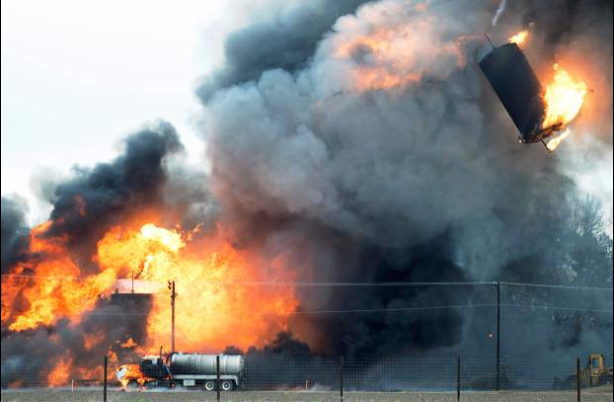Late last week a “wastewater injection well” blew up after water storage tanks were struck by lightning. The site is operated by NGL Water Solutions near the Greely-Weld County Airport outside Greely Colorado, and has storage tanks to hold fracking wastewater that’s to be injected underground. While these are tanks full of water, which you wouldn’t think could explode or catch fire, the water is laced with hydrocarbons due to being the result of fracking operations. The fire was so intense that firefighters weren’t able to attempt to extinguish flames until most of the tanks had exploded and burned. The local news reports seem to be downplaying what occurred, saying that firefighters had the scene under control, nobody was injured, and the effects were contained to the site. However the pictures show an intense firestorm, with large objects being blown sky-high from the explosions.
It says the lightning strike occurred at 1:15 PM, and that there’d been severe storms moving through the area. At about 3PM the fire had worked its way south to a group of storage tanks, and that explosion launched a storage tank into the air landing 60 feet from the site. By 5:30PM the fires had died down to where the firefighters deemed it safe to attempt to extinguish the flames, and by 6:30PM they declared the fire was fully extinguished.
These tanks stored water – water from fracking operations that was destined to be pumped back underground. Normal water doesn’t catch fire or have explosions strong enough to throw water storage tanks sky-high only to land 60+ feet away. The article described this water as having “traces of hydrocarbons” which created vapors, and it’s those vapors which exploded. HOWEVER … how do “traces of hydrocarbons” cause such fires. Let me suggest that such a fire is proof that fracking wastewater contains more than “traces of hydrocarbons”.
Fracking wastewater is also known as Flowback. Hydraulic Fracturing, a.k.a. Fracking, involves pumping a mixture of sand, water and fracking chemicals underground at high pressure. The goal is to fracture underground shale formations so they release hydrocarbons, either oil or natural gas. After a frack job some water returns to the surface, and generally that water is too heavily contaminated by a mix of underground chemicals and fracking chemicals to be of any use. As a result the primary disposal method is to pump the wastewater back underground.
I’ve posted quite a lot of information about this on greentransportation.info![]()
According to Doug White, a Vice President of NGL Water Solutions interviewed in the article, the company operates several similar facilities in Weld County. Therefore, we’re not to worry that NGL can’t handle their all-important task of disposing of fracking wastewater. There’s another worry, isn’t there? That any of those sites could blow up in a similar way, right?
That’s not an unreasonable worry, because White is quoted saying “We’ve had it happen in Texas, several times, actually. That’s a part of the business.”
Not to worry – business as usual.
Another thing that’s seemingly business as usual is fracking induced earthquakes. It’s been observed that areas with lots of fracking operations tend to have unusually high earthquake rates. A sidebar in the Greely Tribune article linked above said that this specific wastewater injection facility had been implicated in at least two induced earthquakes.
How significant is the hydrocarbon content of fracking flowback wastewater? According to an article on Oil And Gas Product News,![]() the hydrocarbon content varies based on the drilling site, but that at least one company thinks there’s enough to warrant developing a product to extract those hydrocarbons for sale to the oil industry. The company, Oil Skimmers Inc, has sold for over 40 years a gizmo to extract floating hydrocarbons from wastewater. They’re looking to sell that product into the fracking industry, giving wastewater disposal operators potential for a second income stream.
the hydrocarbon content varies based on the drilling site, but that at least one company thinks there’s enough to warrant developing a product to extract those hydrocarbons for sale to the oil industry. The company, Oil Skimmers Inc, has sold for over 40 years a gizmo to extract floating hydrocarbons from wastewater. They’re looking to sell that product into the fracking industry, giving wastewater disposal operators potential for a second income stream.
Not to worry – it’s just business.
- Is there enough Grid Capacity for Hydrogen Fuel Cell or Battery Electric cars? - April 23, 2023
- Is Tesla finagling to grab federal NEVI dollars for Supercharger network? - November 15, 2022
- Tesla announces the North American Charging Standard charging connector - November 11, 2022
- Lightning Motorcycles adopts Silicon battery, 5 minute charge time gives 135 miles range - November 9, 2022
- Tesla Autopilot under US Dept of Transportation scrutiny - June 13, 2022
- Spectacular CNG bus fire misrepresented as EV bus fire - April 21, 2022
- Moldova, Ukraine, Georgia, Russia, and the European Energy Crisis - December 21, 2021
- Li-Bridge leading the USA across lithium battery chasm - October 29, 2021
- USA increasing domestic lithium battery research and manufacturing - October 28, 2021
- Electrify America building USA/Canada-wide EV charging network - October 27, 2021



















Explosions/fires at oil well heads on ground or at sea are business as usual. Fracking brings a explosive element to the surface. Fire risk is to be expected.
There is nothing particularly different about fracking vs drilling. They are both dangerous and potentially harmful to the environment. Business as usual doesn’t make it good, but ‘picking’ on fracking is a pointless endeavour. Energies and money spent on an alternative is a better way to spend our efforts.
Yes, it would be great to be focusing on the alternatives. It seems though that first step of alcoholics anonymous, about recognizing ones addiction, is also important for this. We collectively need to recognize our collective addiction to fossil fuels, and the costs of that addiction (costs being another of the 12 steps).